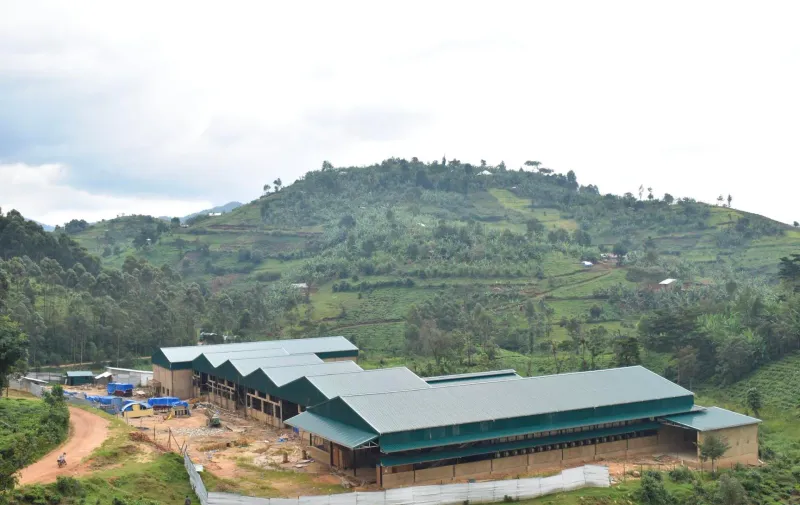
The long-anticipated rural electrification of Kayonza Growers’ Tea Factory Limited has finally been commissioned, a development that local leaders believe will reinvigorate Kanungu’s declining tea industry and unlock long-delayed economic benefits for more than 8,300 smallholder farmers.
During Tuesday’s commissioning ceremony, Minister of Energy and Mineral Development Dr. Ruth Nankabirwa explained that government stepped in after recognising that the farmers' multimillion-shilling investment in Mpungu was being threatened by the high cost of running a generator. She warned that, “Without electricity, your investment would stall, jobs would be delayed, and the anticipated economic returns would not be realised.” She added that, “By powering Mpungu Tea Factory, the Government has catalysed a value chain that will transform lives for generations.”
The UGX 883 million project entailed constructing 1.31 kilometres of medium-voltage line, 1.71 kilometres of low-voltage line, and installing three transformers. Dr. Nankabirwa also thanked residents of Mpungu and Kanungu for offering land for the electricity infrastructure, saying, “I salute you for this sacrifice.”
Mpungu Sub-County LC3 Chairperson Robert Ndyomugyenyi said the power extension had come at a moment when farmers were battling depressed tea prices and inconsistent factory operations. He remarked, “To find a place like this connected to the national grid is remarkable.” He asked the minister to express the community’s gratitude to the President, declaring, “This sub-county and the entire district will give him 100% support in the next election.”
Still, Ndyomugyenyi appealed for electricity to reach the three villages that gave up land for the transmission line but remain unconnected. “These villages urgently need power,” he said. He also pointed out that the area’s ecotourism site, where the community planned to host the minister for lunch, “is still in darkness.” According to him, electrifying these communities would pave the way for faster development.
Kanungu LC5 Chairperson Sam Kajojo reflected on the district’s tea story, from the surge in production following President Museveni’s 2008 intervention to the crisis currently gripping the sector. Government investment of UGX 36 billion in tea seedlings had expanded the number of farmers from 1,200 to over 12,000 and pushed annual Greenleaf earnings from UGX 10 billion to UGX 54 billion. But in the last two years, prices collapsed from UGX 5,550 per kilo to barely UGX 200. Many farmers can no longer pay labourers, and, as Kajojo noted, “Many have abandoned their gardens; some have turned into forests.”
He pleaded for support to improve quality, especially fertiliser, and highlighted Uganda’s poor returns compared to neighbouring countries: Rwanda earns $3.0 per kilo, Kenya $2.8, while Uganda earns only $0.8. He also reminded the minister of the unresolved UGX 75 billion that government owes farmers for seedlings supplied since 2016/17. “Some farmers lost property; others lost their lives; others fled due to pressure from banks,” he said, stressing that although Kanungu remains an NRM stronghold, “our livelihoods depend on tea. We need help.”
Leaders further warned that persistent electricity fluctuations could undermine the district’s growing industrial base. Kajojo observed that, “Sometimes the electricity that arrives cannot even run factory motors,” advocating for Kanungu’s linkage to the Rwandan high-voltage line and the long-awaited operationalisation of the Ishasha island mode. The district now hosts five tea factories, 57 coffee factories, and multiple rice-processing plants, all reliant on stable power.
Grace Kyomugisha, Board Chairperson of Kayonza Growers’ Tea Factory, explained that the Mpungu Tea Factory was initiated in 2017 in response to excess leaf production. Construction followed in 2020 with financing from Uganda Development Bank, and commissioning was planned for July 2023. However, operations stalled due to the absence of electricity. According to Kyomugisha, “The delay has resulted in accumulation of interest payments.” She appealed for the working capital promised by the President on 19 August 2025 and stressed the high operational burden caused by unreliable power supply: “Running a generator is six times more expensive than electricity.”
Dr. Nankabirwa said the electrification project supports the Energy Policy 2023, National Development Plan IV, and the government’s Tenfold Growth Agenda. “This is not just about lighting a factory,” she said. “It is about jobs for youth and women, higher incomes for 8,300 farmers, and unlocking Uganda’s export potential.” She encouraged residents to apply for free household connections under the Electricity Access Scale-Up Project, noting Kanungu’s untapped potential for expanding electricity access.
With Mpungu Tea Factory finally connected to the national grid, hopes are high that the improved power supply will stabilise production, boost farmer earnings, and restore confidence in the troubled tea sector. Still, unless issues such as unstable electricity, unpaid arrears, falling global tea prices, and limited rural access are addressed, Kanungu’s tea-dependent communities remain vulnerable.













Sunrise reporter
Leave a Comment
Your email address will not be published.